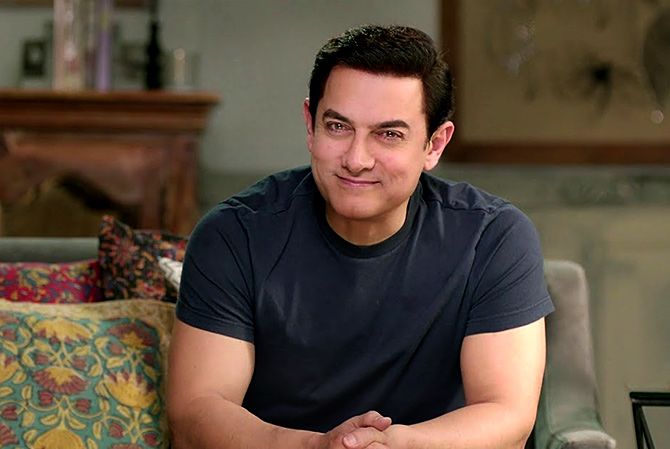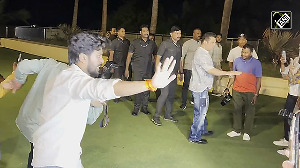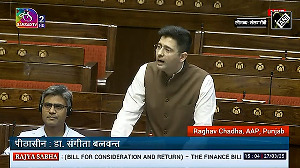Though it is a little too neat and a little too light, Rubaru Roshni is important because it is telling us stories of people who have experienced an 'Inner Migration' in their lives, notes Sreehari Nair.

Svati Chakravarty Bhatkal's Rubaru Roshni, a compendium of three true stories about brutal crimes, thins out as it goes along.
Presented and narrated by Aamir Khan, the film begins as a plea for Tough Love and winds up as yet another vehicle for showcasing Khan's brand of Blubbering Compassion.
The first story takes as its backdrop the killing of Congress MP Lalit Maken and his wife Gitanjali by a gang of Sikh youths in the summer of 1985.
This tense, dramatic and almost flawless section of Rubaru Roshni -- juxtaposing interviews of Avantika, Lalit Maken's now 38-year-old daughter, with interviews of Ranjit Singh alias Kukki, the man who had gunned down Avantika's parents when she was only four -- isn't a straight attempt at generating in us feelings of amnesty.
This section is chilling because it manages to evolve beyond its mission statement: It turns into a commentary about the cycle of hate, and how it functions.

We watch in horror as Avantika shows us her mother's pendant -- with her blood from 31 years ago still fresh on it. It seems apt, almost sweet justice-like, when Avantika says she grew up fantasising about slaughtering her parents's murderers.
We then hear Kukki, the murderer, reveal his attachment to 'Sant Bhindranwale', and his reading about Lalit Maken's involvement in the Sikh massacres that followed Indira Gandhi's assassination.
He proceeds to reminisce about the actual day of killing, and we register a slight crack in his voice when he talks about Gitanjali Maken wrapping herself around her husband as Kukki and gang rained bullets.
And when the baby-faced killer says firmly, 'We didn't mean to kill her (Gitanjali),' it complicates our responses.
Picking sides becomes close to impossible.
The ironies and parallels in this section aren't simplistic: They are heartrending without overtly aiming to be so.
When Kukki details his time in a correction facility in the United States (Kukki and one of his gang members escaped to the US post Maken's killing), we get a clear picture of how, despite its therapeutic intentions, a process such as 'correction' can be so difficult to endure.
We then wriggle uneasily as Avantika speaks about her years as an adolescent: When she was often tagged as an 'orphan'.
As she speaks (fighting her tears) about the anger that was festering inside her, we understand how she, like her parents's assassin, has also been a prisoner.
A story about a brutal crime slowly becomes a story of two people bound by a common tragedy.
Svati Chakravarty Bhatkal knows how to ask sharp questions without being hostile, and Rubaru Roshni offers a steady accumulation of perspectives when it is purely a dialogue between Bhatkal and the participants (and when there is no Aamir Khan's voiceover to guide the narrative).
Bhatkal isn't an interrogator as much as she is a social investigator and doesn't (thankfully) seem to be a believer in Hannah Arendt's The Banality of Evil.
The killers in the first two stories (Kukki in the first, and Samandar Singh in the second: A peasant who had stabbed to death, Rani Maria, a Kerala-based missionary, in 1995) do express remorse for their respective acts, but they also recount the 'charge' they felt at the precise instant of the killing.
When Samandar Singh talks about the intensity of the stabbing, about how he could not stop once he got the knife plunging into Rani Maria's heart, it reminded me of Benito Mussolini's foreign minister describing the sight of bombs exploding on desperate Ethiopians as 'flowers bursting into bloom'.
Bhatkal knows that to be a serious artist, one has to look at a phenomenon, however awful it may seem from the outside, as half-awful and half-interesting.
The director may detest killing, but she is also interested in knowing the killers intimately; and the most poetic parts of Rubaru Roshni emerge out of this curiosity of its maker.
In one of the film's great passages, Samandar Singh says he doesn't know his exact age, because, in his childhood, years were chronicled on the basis of standout events.
'I was probably born in the Year of the Big Flood,' Samandar muses wistfully.

In a strange sense, this aesthetic of the film, which allows the cold-blooded killers to free associate, is the aesthetic we badly miss in the third story -- which is about American national Kia Scherr who lost her daughter and husband in the 26/11 terror attacks in Mumbai.
In Avantika's and Kukki's story, the point of the film is made, and made without much noise: About how forgiveness may just be the only way to heal the wounds caused by heinous crimes.
However, by the time we move toward the climax of the second story and then into the third, the obvious 'message' of Rubaru Roshni starts to feel like its shtick, its party line.
The animus of the first story just isn't present in the last two, and the protagonists of these sections, Sister Selmi (sister of the slain Rani Maria) and Kia Scherr, appear to have been photographed in the process of broadcasting self-help lessons. (Aware of their own heroisms, their faces glow a little).
By the end, Rubaru Roshni comes on too strong.
Having watched the feature in Hindi, I wish there was only one version of this film playing, supported by smart subtitles.
There is something almost tactile about hearing a story being narrated in a speaker's native tongue (the musicality of the utterances then becomes a big component of the storytelling), and in Rubaru Roshni, the dubbing -- especially in Kia Scherr's section -- fails to capture the emotional texture of the words being uttered; it feels, as though, in trying to convey the meaning of Scherr's lines, her emotions have been rationalised.
Though it is a little too neat and a little too light, Bhatkal's film is important because it is telling us stories of people who have experienced an 'Inner Migration' in their lives.
Viewed from this perspective, it talks about the dangers of holding onto fixed positions, and mocks at the inability of our political ideologues to see human possibility in 'the other'.
Released on January 26, I think there is a subliminal message on how we can advance as a Republic.
The release date could well have been strategic, but it is no more than a spiritual coincidence that Rubaru Roshni arrives on our TV screens in the same week that another movie pulled into our theatres. One in which a character based on a politician proudly owns up to his misdeeds, deflecting counter-questions with a few whistle-worthy quips -- because that, you see, is the brave and manly thing to do.
In a way, it is against this kind of hollow gallantry that Rubaru Roshni campaigns.
For gallantry is not to be learnt from someone who never had his theories or beliefs tested; who never knew what getting caught up in the vast, complicated, penal network of the State amounts to.
Gallantry is to be found in people like Kukki who once killed because he believed he was acting in the service of something higher, but who, in experiencing what it means to have his soul crushed, today speaks in a voice that comes out of a tired mouth.
'If a situation, such as in the past, presents itself once more, I might be forced to rebel again. But my methods, this time, would be different,' says Kukki, and waits for the next train of thought to arrive.
There is something to be said about the character of a nation whose criminals are more honourable than its politicians.













 © 2025
© 2025